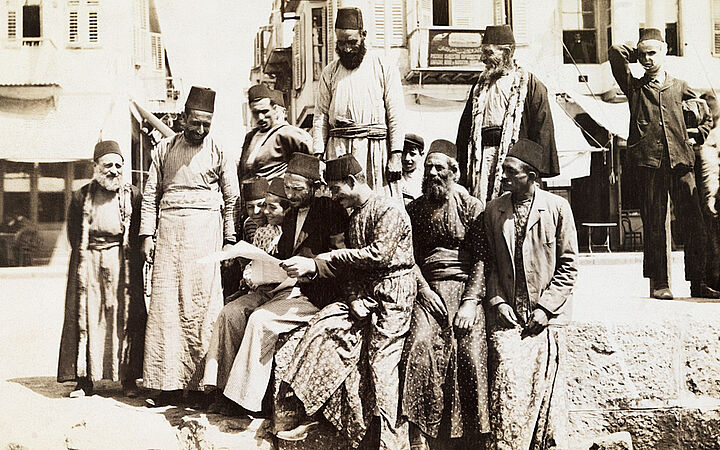Mittwoch, 26. Mai 2021, 18:30 - 20:00 iCal
Ringvorlesung Turkologie Sommersemester 2021
„Happy Together”: The entangled history of Jewish communities in Ottoman lands and Turkey
Institut für Orientalistik
Vortrag
I. Izzet Bahar (Istanbul)
The stance of Turkey vis-à-vis the “Jewish Problem” during World War II
Abstract
During the Second World War, the Turkish term “Yahudi Meselesi” which can be translated as “Jewish Problem” could be seen in the correspondence between the Turkish Ministry of Foreign Affairs and her diplomats in abroad. In a broader sense the term was covering all the policies and implementations Turkish Jews were facing starting from the earlier years of the Nazi regime: their ostracization, losing of their citizenship rights, Aryanization-confiscation of their assets and belongings, forced emigration, and their extermination at the Final Solution stage. These communications reflect Turkey’s preference to stay aloof to the harsh policies against Jews which became increasingly more brutal and lethal with the war years. The issue even was regarded as a nuisance that should be avoided or not to be bothered about. However, as one of the five neutral countries of Europe that had her own Jewish citizens living in German-controlled Europe and with its strategic location as a gate to the Balkans where there were large local Jewish communities and Jewish fugitives from Central Europe, Turkey’s policies were critically important as a matter of life or death to many.
In this lecture, after analyzing the stance of Turkey vis-à-vis the Jewish problem beginning from the pre-war years, we will focus on two aspects of this stance during the war years. As first, we will examine both Turkish Government’s and her diplomats’ approach to Turkish origin Jews living in German occupied France. In those years France had by far the biggest number Jews of Turkish living in Europe. Furthermore, a large number of documents - correspondence of Turkish diplomatic delegations in France with each other, and with Ankara - that became available in the last decade gives us the opportunity to make a clearer assessment of the policies of the time. As second aspect, we will examine Turkey’s attitude towards Jewish refugees and try to answer to what extent Turkey permitted the escapee Jews to go to Palestine or any other country passing through her territories. In June 1940, Italy’s entry into the war and Germany’s occupation of France became a turning point. Consequently, with the closure of the Mediterranean to transportation, Turkey gained critical importance as the most viable escape route for refugees escaping from the atrocities of the Nazi regime.
Bio
Izzet Bahar completed his undergraduate and graduate studies at the Middle East Technical University and at Boğaziçi University Electrical Engineering Departments in Turkey. In 2001, he moved to the USA, where he did his MA and doctoral studies in the Department of Religious Studies at the University of Pittsburgh. His first book The Jewish Historiography on the Ottoman Empire and its Jewry from the Fifteenth Century to the Early Decades of the Twentieth Century, based on his master’s thesis, was published in 2008 by Isis Publishing House.
Starting from his doctoral studies, Dr. Bahar did research broadly on Turkey’s policies towards the “Jewish Problem” arisen with the rise of the Nazi regime in Germany, particularly focusing on the policies of the Turkish government regarding the Turkish citizens of Jewish origin living in German-controlled Europe, as well as Jewish refugees fleeing the German atrocities during World War II. His work on this topic, which encompasses an extensive review of numerous archives from different countries, has been published by Routledge Press in 2015 under the title Turkey and the Rescue of European Jews. Bahar’s recent book written in Turkish (entitled İkinci Dünya Savaşında Türkiye ve “Yahudi Meselesi” and published in 2020 by Libra Publishing House) brought together his studies on four topics: the recruitment of German academicians by the Turkish government between 1933 and 1939; the fate of Turkish Jews in German-occupied France during WWII; the role of Turkish diplomats in the rescue of Turkish Jews; and finally, Turkish policies vis-à-vis Jewish refugees during the war years. Bahar is currently continuing his research studies as an independent scholar in Pittsburgh.
Über diesen Link können Sie direkt dem Zoom-Meeting beitreten
univienna.zoom.us/j/94972532827
Zur Webseite der Veranstaltung
Veranstalter
Kontakt
Ayse Dilsiz Hartmuth
Institut für Orientalistik
+43-1-4277-43451
ayse.dilsiz@univie.ac.at
Erstellt am Freitag, 26. Februar 2021, 10:15
Letzte Änderung am Dienstag, 23. M�rz 2021, 16:33

